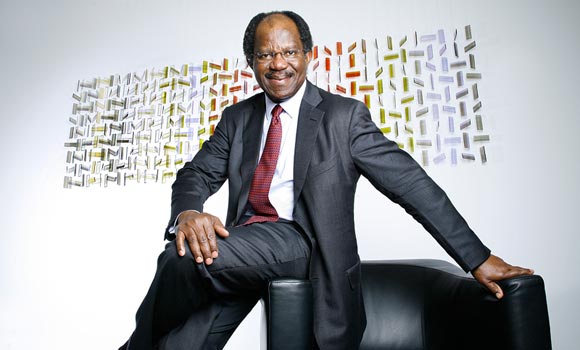- Trump Formally Unveils Bayo Ogunlesi as Strategic and Policy Forum Adviser
U.S. President-elect Donald Trump yesterday formally unveiled Nigerian-born, U.S.-based Bayo Ogunlesi as a member of his Strategic and Policy Forum charged with advising the president on economic matters.
According to AFP, Trump’s Transition Team, in a statement yesterday, said the president-elect also announced three additional members to join the forum.
“Earlier this month, President-elect Trump established the President’s Strategic and Policy Forum and announced an initial round of 16 members.
“The Forum is composed of some of America’s most highly respected and successful business leaders.
“They will be called upon to meet with the president frequently to share their specific experience and knowledge as the president implements his economic agenda.
“The Forum will be chaired by Stephen A. Schwarzman, the Chairman, CEO, and Co-Founder of Blackstone.
“America has the most innovative and vibrant companies in the world, and the pioneering CEOs joining this Forum today are at the top of their fields,” the Trump team said.
According to Trump, “My administration is going to work together with the private sector to improve the business climate and make it attractive for firms to create new jobs across the United States from Silicon Valley to the heartland.”
Members of the Forum will provide their individual views to the president, informed by their unique vantage points in the private sector on how government policy impacts economic growth, job creation and productivity.
The Forum is designed to provide direct input to the president from many of the best and brightest in the business world in a frank, non-bureaucratic and non-partisan manner.
With yesterday’s announcement of three additional members, the individuals on the Forum now include: Adebayo “Bayo” Ogunlesi, Chairman and Managing Partner, Global Infrastructure Partners.
The others are Stephen A. Schwarzman (Forum Chairman), Chairman, CEO, and Co-Founder of Blackstone; Paul Atkins, CEO, Patomak Global Partners, LLC, former Commissioner for the Securities and Exchange Commission; and Mary Barra, Chairman and CEO, General Motors.
Toby Cosgrove, CEO, Cleveland Clinic; Jamie Dimon, Chairman and CEO, JPMorgan Chase & Co; Larry Fink, Chairman and CEO, BlackRock; Travis Kalanick, CEO and Co-founder, Uber Technologies.
Also in the Forum are Bob Iger, Chairman and CEO, The Walt Disney Company; Rich Lesser, President and CEO, Boston Consulting Group; Doug McMillon, President and CEO, Wal-Mart Stores, Inc.; Jim McNerney, former Chairman, President, and CEO, Boeing; Elon Musk, Chairman and CEO, SpaceX and Tesla; and Indra Nooyi, Chairman and CEO of PepsiCo.
The list also includes Ginni Rometty, Chairman, President, and CEO, IBM; Kevin Warsh, Shepard Family Distinguished Visiting Fellow in Economics, Hoover Institute, and former Member of the Board of Governors of the Federal Reserve System; and Mark Weinberger, Global Chairman and CEO, EY; Jack Welch, former Chairman and CEO, General Electric; and Daniel Yergin, Pulitzer Prize-winner, Vice Chairman of IHS Markit.
Through Global Infrastructure Partners, Ogunlesi has a majority stake in London Gatwick Airport. His company acquired the stake at the airport in 2009 in a £1.455 billion deal.
Global Infrastructure Partners is a joint venture whose initial investors included Credit Suisse and General Electric.
Ogunlesi is also an independent director of Goldman Sachs Group, Inc. He serves on the boards of Callaway Golf Co. and Kosmos Energy Ltd.
He is the chairman of Africa Finance Corporation, where the Nigerian government holds the majority state, and serves on the boards of various non-profits ranging from New York Presbyterian Hospital to the NAACP Legal Defense and Educational Fund, Inc.
Ogunlesi is from Sagamu, Ogun State. His father, Theophilus Ogunlesi, was Nigeria’s first professor of medicine.
He attended Kings College, Lagos, before proceeding to Oxford University, where he graduated with a First Class honours in Philosophy, Politics and Economics.
He also graduated from Harvard Law School in 1979 and later got an MBA from Harvard Business School.
Ogunlesi had a banking career with Credit Suisse First Boston (CSFB) from 1983 and rose to become its executive vice chairman.
During his stint at Credit Suisse, he advised clients on transactions and corporate finance in North and South America, the Caribbean, Europe, the Middle East, Africa and Asia.
Before joining Credit Suisse, Ogunlesi was an attorney in the corporate practice group of the New York law firm, Cravath, Swaine & Moore.
From 1980-81 he served as a law clerk to Associate Justice Thurgood Marshall of the United States Supreme Court.
He was a lecturer at Harvard Law School and the Yale School of Organisation and Management, where he taught a course on transnational investment projects in emerging countries.
Ogunlesi has served as an adviser, though informally, to Nigerian governments. He was an informal adviser to former President Olusegun Obasanjo on privatisation.
Despite having lived in the US for decades, he still maintains ties with his homeland.


 Forex2 weeks ago
Forex2 weeks ago


 Naira2 weeks ago
Naira2 weeks ago
 Naira4 weeks ago
Naira4 weeks ago
 Company News4 weeks ago
Company News4 weeks ago
 Billionaire Watch1 week ago
Billionaire Watch1 week ago




 Naira2 weeks ago
Naira2 weeks ago




 Naira4 weeks ago
Naira4 weeks ago




 Naira1 week ago
Naira1 week ago





















